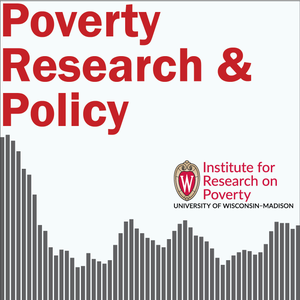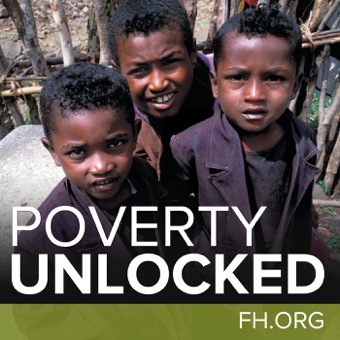
Poverty Research & Policy
Institute for Research on Poverty
- 21 minutes 27 secondsMolly Costanzo on Improving the Economic Well-being for Households with Children with Disabilities
Between 5% and 20% of children in the United States live with a disability. The definition and measurement of disability are constantly changing. Therefore, people with disabilities have been inadequately represented and understudied in research. In this episode, Molly Costanzo shares her research on the economic well-being for households with children with disabilities and recommendations for policymakers, practitioners, and researchers to improve their quality of life.
Molly Costanzo is a scientist at the Institute for Research on Poverty. She has a PhD in social welfare from the University of Wisconsin-Madison. Her research focuses broadly on policies that support children and families.
28 January 2025, 5:36 pm - 26 minutes 52 secondsKathryn Thompson on Quality of Care for Pregnant Black Medicaid Enrollees
There are many ways to assess the quality of care that pregnant people receive pre- and post-partum, as well as during delivery itself. Dr. Kathryn Thompson shares her findings on how the care that pregnant Black Medicaid enrollees receive compares to their more affluent white peers, and the policy and practice opportunities for addressing the social determinants of health that are involved.
Kathryn Thompson is an Assistant Professor at Boston University’s School of Public Health in the departments of Community Health Sciences and Health Law, Policy, and Management. She is also an IRP 2024–2025 Visiting Poverty Scholar.
18 December 2024, 6:14 pm - 20 minutes 46 secondsColleen Heflin on SNAP and Reauthorization of the Farm Bill
The federal Farm Bill expired at the end of September 2024 and was not reauthorized. Funding for the Supplemental Nutrition Assistance Program (SNAP) has been extended through a Continuing Resolution, but that is a stopgap measure. For this episode, Dr. Colleen Heflin joins us to discuss the recent policy brief that she co-authored with Camille Barbin, titled, “How Does the Reauthorization of the Farm Bill Impact SNAP?”
Colleen Heflin is a Professor of Public Administration and International Affairs in the Maxwell School of Citizenship and Public Affairs at Syracuse University. She is also a Senior Research Associate in the Center for Policy Research and the Lerner Center for Public Health Promotion and Population Health. She is also an IRP affiliate.
19 November 2024, 5:27 pm - 34 minutes 21 secondsAnne Sebert Kuhlmann on the Impact of Menstrual Poverty on Vulnerable Individuals
Menstrual poverty, or unmet menstrual hygiene needs, is defined as a lack of appropriate menstrual products in necessary quantities; access to soap and water for proper hygiene; or ways to dispose of or wash used sanitary materials. The experience of menstrual poverty can have far-reaching impacts on mental and physical health, the ability to work, and consistent school attendance.
For this episode, Dr. Anne Sebert Kuhlmann discusses her research on the impacts of menstrual poverty, and what practice and policy options are available to alleviate the burden on menstruating people.
Reference Papers:
Students' Menstrual Hygiene Needs and School Attendance in an Urban St. Louis, Missouri, District
31 October 2024, 6:42 pm - 29 minutesKatherine Michelmore On Effects of the Expanded Child Tax Credit on Housing Stability for Low-Income Families
When the Child Tax Credit (CTC) was expanded in 2021 in response to the COVID-19 crisis, it provided more support to parents and on a monthly basis. In addition, some very low-income families were eligible to access the CTC for the first time. In this episode, Dr. Katherine Michelmore shares insights from the paper that she co-authored with Natasha Pilkauskas and Nicole Kovski, titled, “The Effects of the 2021 Child Tax Credit on Housing Affordability and the Living Arrangements of Families With Low Incomes.”
Katherine Michelmore is an Associate Professor in the Gerald R. Ford School of Public Policy at the University of Michigan. A leading scholar and educator on the social safety net, education policy, labor economics, and economic demography, she is also an IRP Affiliate.
Paper to provide link for:
1 October 2024, 5:25 pm - 34 minutes 4 secondsGreg Wilson on Racialization in the Nonprofit Sector
Black-Led Organizations (BLOs) are organizations led by an Executive Director and have a majority of full-time employees identifying as African American. BLOs face challenges (e.g., limited funding, diminished agency, exploitation) which can be explained through the framework of racialization. In this episode, Dr. Greg Wilson discusses his research paper titled “An Invisible Impediment to Progress: Perceptions of Racialization in the Nonprofit Sector” that analyzes racialization of BLOs in Madison, Wisconsin.
Dr. Greg Wilson is an Assistant Professor at The Ohio State University, a previous IRP Graduate Research Fellow, and previous IRP Dissertation Fellow. He is interested in understanding how, why, and in what ways the nonprofit sector is racialized and how this system impacts the work of nonprofits led by people of color, particularly those led by African Americans.
Reference Paper: https://journals.sagepub.com/doi/epub/10.1177/08997640241252650
3 September 2024, 6:14 pm - 28 minutes 5 secondsAnna Godøy and Jennie Romich on the Impacts of Increasing the Minimum Wage for Working Parents and Child-Care Workers
Minimum wage workers, especially those with children, face barriers to affordable child care. Child care costs can prevent working parents who earn minimum wage from participating in the labor market. Alternately, many child-care workers also face financial barriers because they, too, earn minimal wages. Therefore, increasing the minimum wage would alleviate financial burdens for both parents and child-care workers. In this episode, both Dr. Anna Godøy and Dr. Jennie Romich discuss their research on minimum wage and its effects on parental labor supply and the child care sector.
Anna Godøy is a Senior Research Fellow at the Ragnar Frisch Center for Economic Research and an Associate Professor at the Department of Health Management and Health Economics at the University of Oslo, Norway. Her research interests include empirical labor economics, health economics, and policy evaluation.
Dr. Jennie Romich is an Associate Professor of Social Work at the University of Washington, director of the West Coast Poverty Center, an active member of the Center for Studies of Demography and Ecology, and an IRP affiliate. Romich studies resources and economic well-being in families with a particular emphasis on low-income workers, household budgets, and families’ interactions with public policy.
Reference Papers: Parental Labor Supply: Evidence from Minimum Wage Changes
How will higher minimum wages affect family life and children's well‐being?
15 August 2024, 8:09 pm - 37 minutes 11 secondsCarl Gershenson On Eviction and the Rental Housing Crisis in the Rural United States
There are more than 17 million renters in the rural Unites States. While popular perceptions of eviction may be that they are predominantly an urban issue, low-income rural renters face some unique challenges in finding and maintaining secure housing. Dr. Carl Gershenson shares insights from his extensive work on eviction, and in particular from the paper that he co-authored with Dr. Matthew Desmond, titled “Eviction and the Rental Housing Crisis in Rural America.”
Carl Gershenson is Lab Director at The Eviction Lab at Princeton University. His research focuses on the causes and consequences of housing instability, with a special focus on how eviction leads to further economic and residential insecurity.
16 July 2024, 2:19 pm - 36 minutes 22 secondsJosé Loya On How Race, Gender, And Age affect Access To Mortgage Credit And The Implications For Inequality
Homeownership is one of the most common ways to accumulate wealth and promote intergenerational economic mobility in the United States. But even with laws and policies designed to ensure equal access to housing and financing, access to mortgage credit is far from equal. Factors like the race, gender, and age of the applicant can result in less favorable loan terms and higher rates of denial and default. Dr. José Loya discusses his research on how different demographic factors affect access to mortgage financing, and what policy and practice approaches might help to lessen inequity in this area.
José Loya is an Assistant Professor in Urban Planning at UCLA’s Luskin School of Public Affairs and a faculty affiliate with the Chicano Studies Research Center. He is also a 2023-2025 IRP Emerging Poverty Scholar.
20 June 2024, 6:46 pm - 31 minutes 37 secondsMarci Ybarra on Challenges for Latina Mothers Before and During the COVID-19 Pandemic
COVID-19 interrupted life on multiple levels for many people regardless of race, economic class, or citizenship. For Latina mothers who either lacked legal status or were part of a mixed-status household, the pandemic intensified the challenges they faced even before this health and economic crisis. In their paper, “No Calm Before the Storm: Low-Income Latina Immigrant and Citizen Mothers Before and After COVID-19,” Dr. Marci Ybarra and Francia Mendoza Lua share insights gained through interviews with Latina moms in Chicago before and during the pandemic.
Dr. Ybarra is an Associate Professor in the Sandra Rosenbaum School of Social Work at the University of Wisconsin–Madison and is an IRP Affiliate. Her research interests include welfare reform, paid family leave, the children of immigrants, and the socioeconomic well-being of low-income families.
1 April 2024, 1:54 pm - 28 minutes 2 secondsJesse Rothstein On Ways To Reduce Intergenerational Poverty
Experiencing poverty in childhood can hinder a person’s opportunities throughout their own lifetime, and those of their children and grandchildren as well. The National Academies of Sciences, Engineering, and Medicine recently released a report titled “Reducing Intergenerational Poverty.” For this episode, we're joined by Jesse Rothstein, who served as a member of the committee that produced the report. He shares the research and findings on several of the key drivers of intergenerational poverty that the committee identified and examined, as well as what policy approaches may help to interrupt the cycle and why that matters.
Dr. Jesse Rothstein is a Professor of Public Policy and Economics at the University of California, Berkeley. Previously, he was Senior Economist at the U.S. Council of Economic Advisers and then Chief Economist at the U.S. Department of Labor.
19 March 2024, 5:12 pm - More Episodes? Get the App
Your feedback is valuable to us. Should you encounter any bugs, glitches, lack of functionality or other problems, please email us on [email protected] or join Moon.FM Telegram Group where you can talk directly to the dev team who are happy to answer any queries.
 McSilver Institute for Poverty Policy and Research
McSilver Institute for Poverty Policy and Research
 Poverty Unlocked
Poverty Unlocked
 Wealth & Poverty from Marketplace APM
Wealth & Poverty from Marketplace APM
 OFF-KILTER with Rebecca Vallas
OFF-KILTER with Rebecca Vallas